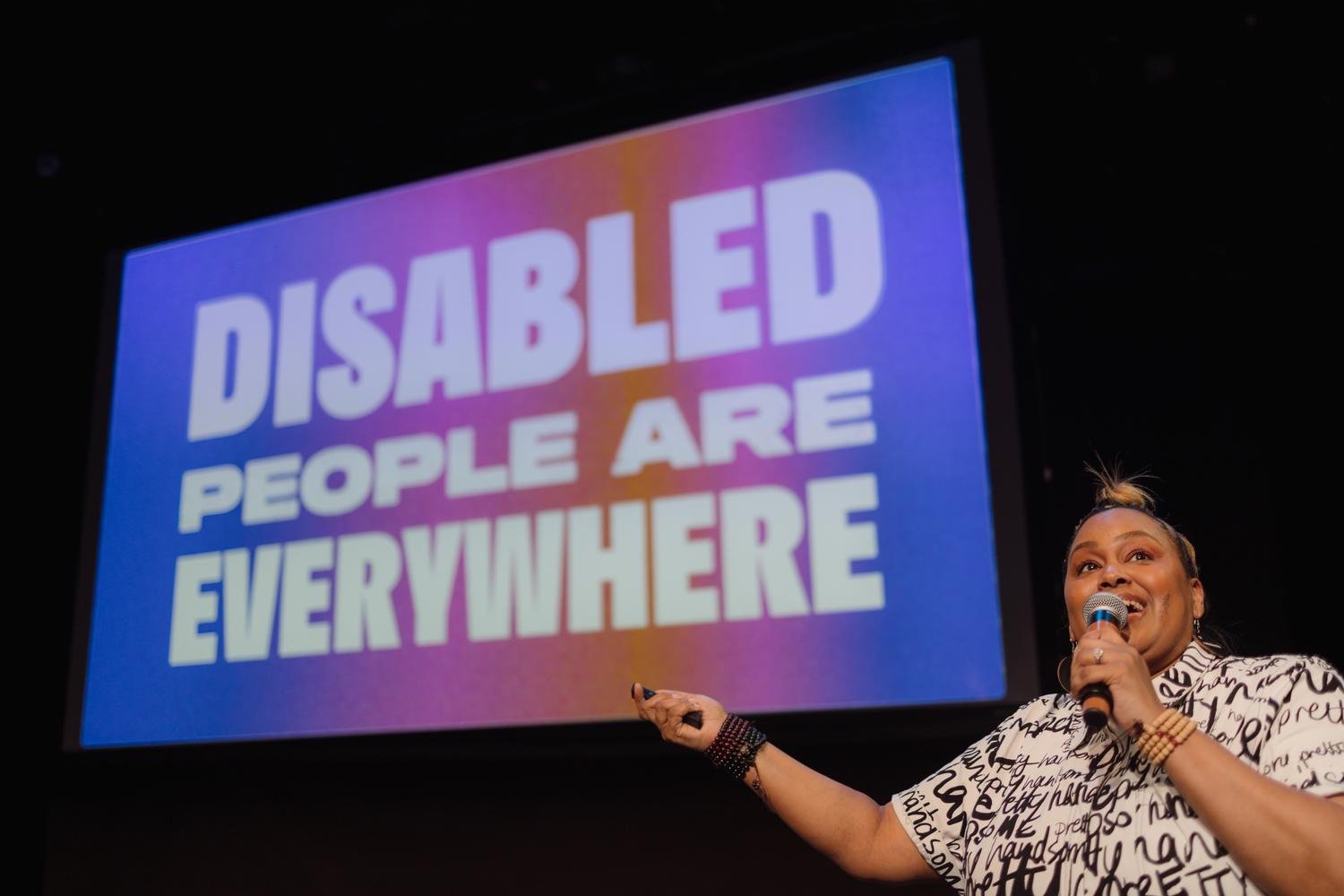
Image Alternative Text: Depicted is artist, educator, and activist Jen White–Johnson beside artwork that reads, "Disabled People Are Everywhere" in white text against a bright-colored blue, purple/pink, and orange background. Photograph by Marissa Alper.
Written by:
Patricia Fortunato, Content and Program Manager, Clinical Research and Grants, NeuroMusculoskeletal Institute (NMI); and Mental Health and Suicide Prevention Training and Content Developer, Department of Psychiatry, Rowan–Virtua School of Osteopathic Medicine (Rowan–Virtua SOM) (fortun83@rowan.edu)
Thank you to staff and faculty colleagues across Rowan University, for collaborating and helping to provide input and resources for Disability Employment Awareness Month and year-round at go.rowan.edu/ndeam.
Together with all Rowan colleges and schools, we are committed to supporting neurodivergent people and people with disabilities; and overall diversity, equity, and inclusion across our campuses and communities.
Interested in contributing to the Rowan University DEI website/blog and/or social media? Please complete the following brief interest form and share with student groups and colleagues across all Rowan colleges and schools: go.rowan.edu/deicontent
Brad Lomax (b.1950; d. 1984)
Lomax was a disability rights activist and civil rights leader. As an adolescent, he was diagnosed with multiple sclerosis. He founded the Black Panther Party (BPP) District of Columbia chapter and spearheaded the first African Liberation Day demonstration in 1972. After moving to Oakland, Lomax was unable to access public transportation/buses without being lifted on to them, and this sparked his participation in the disability rights movement as a key activist. He worked to open a Center for Independent Living (CIL) in East Oakland, supported by the BPP. In 1977, he participated in the sit-in in San Francisco to urge the passage of Section 504 of the Rehabilitation Act, and encouraged the local BPP to join the group. With the BPP's support, Section 504 was signed into law.
Lomax's legacy lives on and he is honored as part of disability awareness and Black history observances.
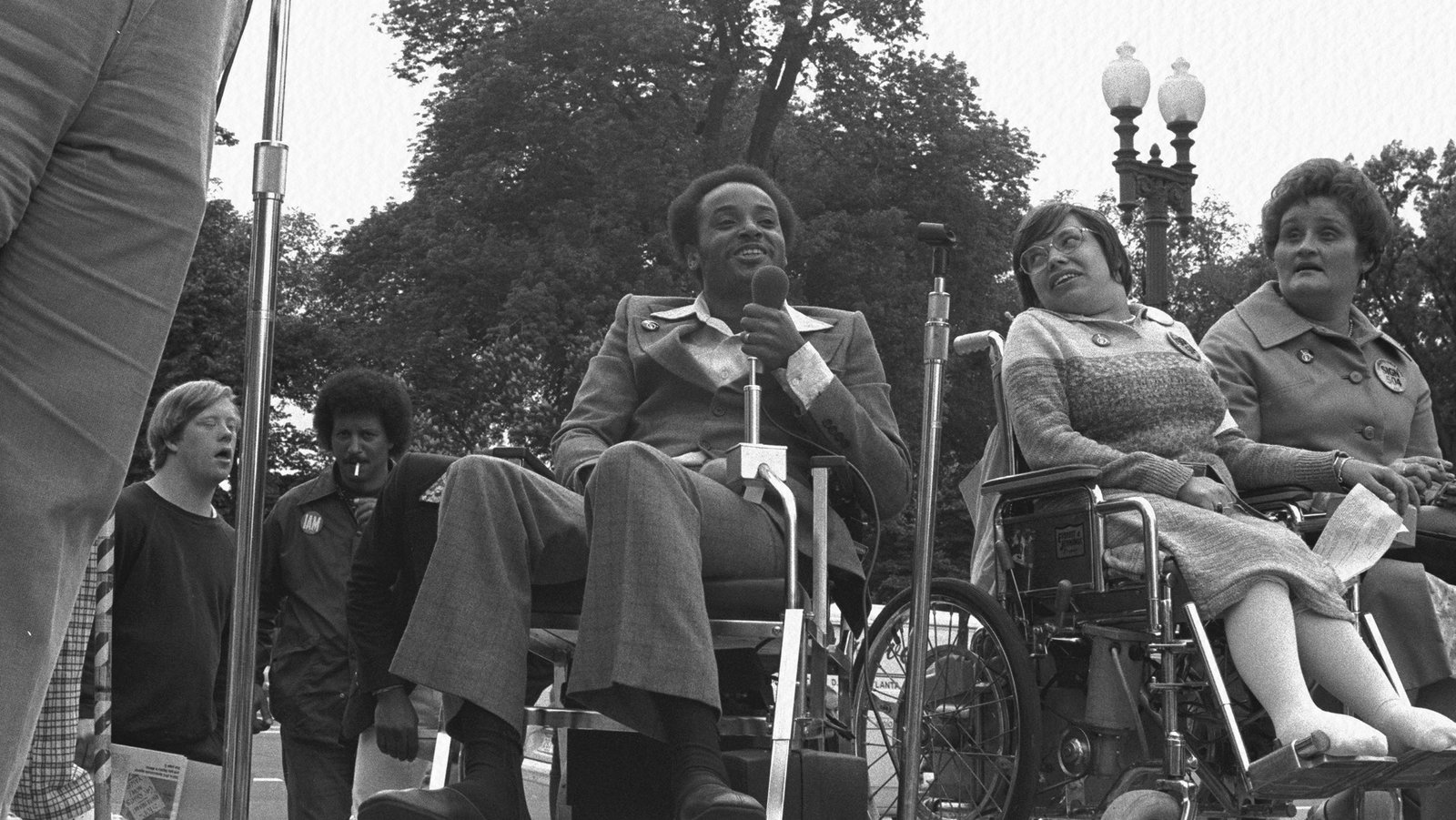
Image Alternative Text: Depicted is Brad Lomax, center, next to Judith Heumann in 1977, at Lafayette Square in Washington. Photograph by HolLynn D'Lil.
Jazzie Collins (b. 1958; d. 2013)
Collins was a community organizer and transgender activist who led social justice causes in San Francisco. She publicly shared living with human immunodeficiency virus (HIV), and focused on disability rights and transgender rights. She organized for older adult and disability action and was vice chair of San Francisco's LGBT Aging Policy Taskforce, and served on the Board of Directors for the San Francisco Trans March.
Collins' legacy lives on and a permanently supportive housing development, Jazzie Collins Apartments, was completed in 2022, providing homes for people previously experiencing homelessness.
Jean–Michel Basquiat (b. 1960; d. 1988)
Basquiat was a prolific artist, part of the neo-expressionism movement, whose works centered on the dichotomy of integration versus segregation, and emotional versus physical experience. His art integrated both the rhetorical and visual for introspection and to raise awareness of systemic power structures and racism. Basquiat struggled with opioid use disorder (OUD) and while working to recover, died of overdose at the age of 27. His art serves as an inspiration to the recovery movement and people in all stages of recovery and healing, and has been featured as part of patient education in clinical settings.
A pilot program in 2018, led by Full Radius Dance in Atlanta, a physically integrated dance company that centers people with disabilities, convened dancers, historians, and disability studies scholars "in an effort to expand the lenses through which art is perceived." Through this programming, the following themes were explored: disability representation in art; shifting the paradigm of traditional perspectives of disability and movement; and representation of bodies in works of art. Basquiat's art was featured and evaluated from disability studies perspectives, and these evaluations then inspired performance at the High Museum Art in Atlanta.
A physical therapy student wrote about experiences participating in this programming and the importance of his art in the context of race, culture, pain, and disability, in the previously linked Journal of Humanities in Rehabilitation.
Learn more about Basquiat's life and legacy at basquiat.com.
Stacey Park Milbern (b. 1987; d. 2020)
Milbern was a queer disability justice activist who advocated for Black, Indigenous, and People of Color (BIPOC) and trans and gender-expansive people to be included and accepted in mainstream disability justice activism. In partnership with queer disabled BIPOC, she launched the Disability Justice Culture Club (DJCC). A goal of Milbern's was to renovate her home and create a space for queer disabled BIPOC to gather and organize, centered on joy. During emergencies, DJCC mobilized to disseminate mutual aid among communities; and in response to voluntary power shut-offs, organized the Power to Live campaign. Milbern, and close friend Andraéa LaVant, served as co-impact producers for the Netflix documentary, Crip Camp, centering disability communities as a mainstream focal point.
In 2022, Google honored Milbern on its homepage with a Google Doodle created by Art Twink in collaboration with Milbern's loved ones/family and LaVant, as well as a video and feature story on her legacy.
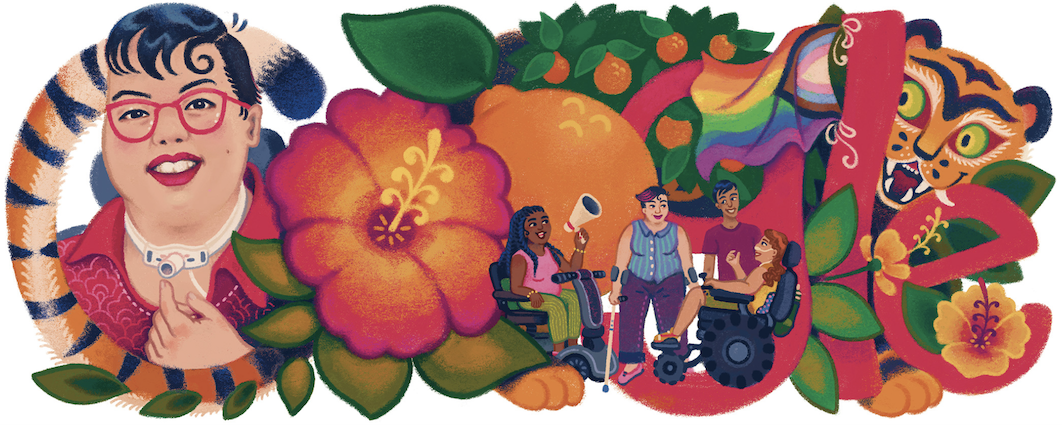
Image Alternative Text: Depicted is an illustration of Stacey Park Milbern created by Art Twink in collaboration with Milbern's loved ones/family and Andraéa LaVant. Milbern is depicted alongside bright-colored flowers, leaves, fruit, a tiger, and four diverse people with disabilities.
Judith Heumann (b. 1947; d. 2023)
Heumann was a disability rights activist whose mainstreaming of disability rights extended into international development. Raymond Wos, Jr., an undergraduate student of history education at Rowan University, and Dr. Brent Elder, an associate professor of interdisciplinary and inclusive education at Rowan, wrote a tribute to Heumann in March of 2023. Click here for the tribute.
Alice Wong
Wong is a disability representation activist, writer, and content creator, and founder of Disability Visibility Project, "an online community dedicated to creating, sharing, and amplifying disability media and culture." She is also a co-partner of Disabled Writers, an employment resource dedicated to connecting editors with disabled writers and journalists; #CripLit, an online chat series for disabled writers; #CripTheVote, a non-partisan online chat to encourage civic participation of disabled people; and Access is Love, "a campaign that aims to help build a world where accessibility is understood as an act of love instead of a burden or an afterthought."
Wong's writing, activism, and overall work have been featured in the New York Times; Radiolab; and CNN's United Shades of America, among other publications and content mediums. She has served on the National Council on Disability, advising the White House and federal agencies on policies and practices that affect people with disabilities.
Haben Girma
Girma is a disability rights advocate and human rights attorney dedicated to advancing disability justice. Born deafblind, Girma advocated for her legal rights to accommodations in her campus cafeteria while a student at Lewis and Clark College, and went on to earn her juris doctor at Harvard Law School, now working to increase access to digital content accessible to people with disabilities. In 2013, she was recognized by the White House as a Champion of Change.
Girma has presented on and advocated for accessible content, including at a Technology, Entertainment, Design (TED)x Talk, after which she confronted the organization for not readily providing closed captioning (CC) for both hers and all enduring recorded talks; and accessible design at an Apple Worldwide Developers Conference.
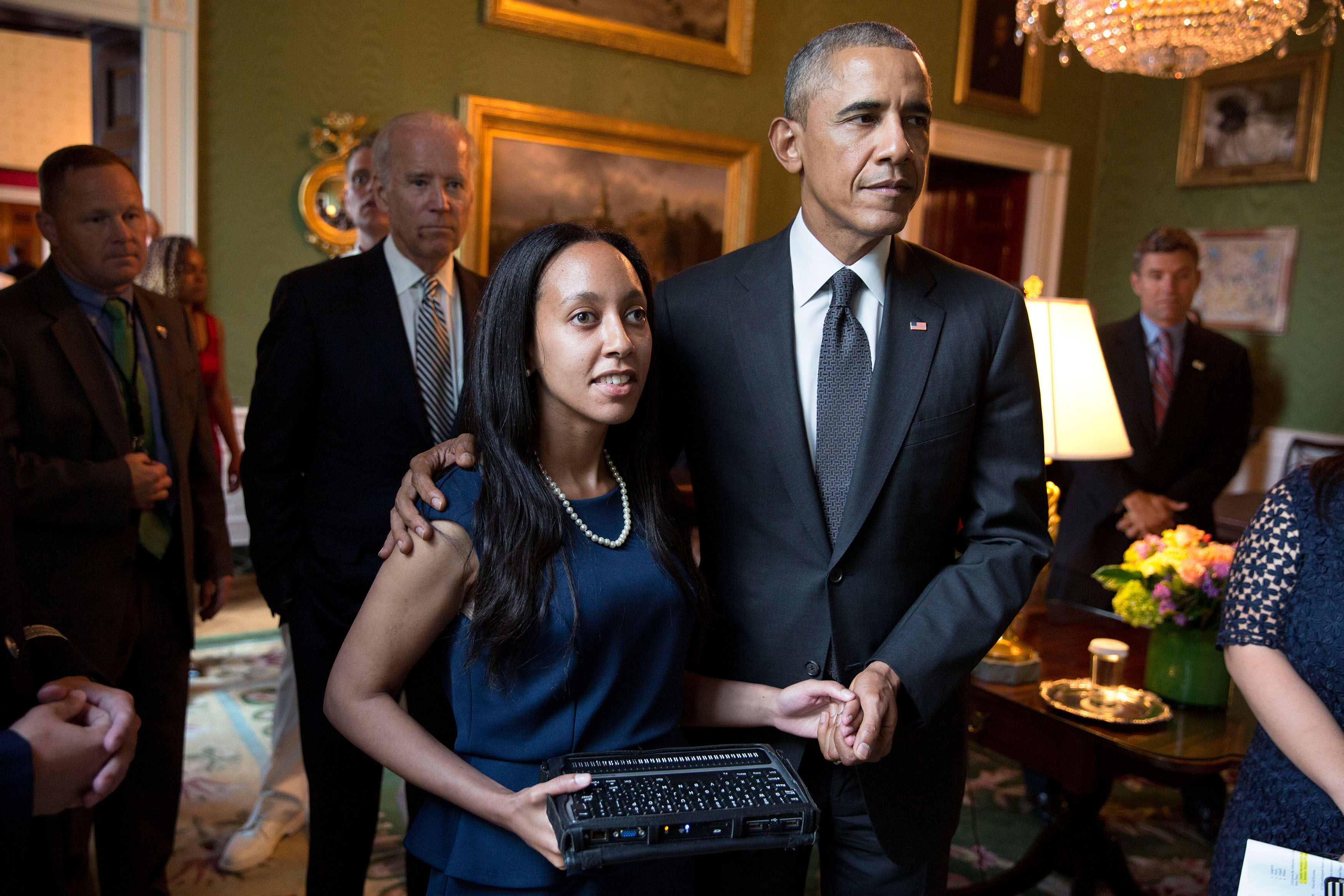
Image Alternative Text: Depicted are Haben Girma and President Obama, standing together during the 25th Anniversary Celebration of the Americans with Disabilities Act (ADA) at the White House. Photograph by Pete Souza.
Jen White–Johnson
Johnson is an artist, educator, and activist who centers disabled and neurodivergent joy in her work. Excerpted from Johnson's website:
"My definition of Mothering as an act of Resistance means to redesign ableist visual culture. The sole intention is to empower and activate change encouraging communities to engage in conversations about acceptance, rooted in how Black Neurodivergent children are valued and seen. My work explores the erasure of black disabled children in digital and literary media. The visuals I make using photo and design are my own reflections that amplify conversations with the Disability community. It ignites the continued need to develop anti-racist, anti-ableist media."
Click here for her recent discussion with the Disability and Philanthropy Forum on ableist stigma in education.
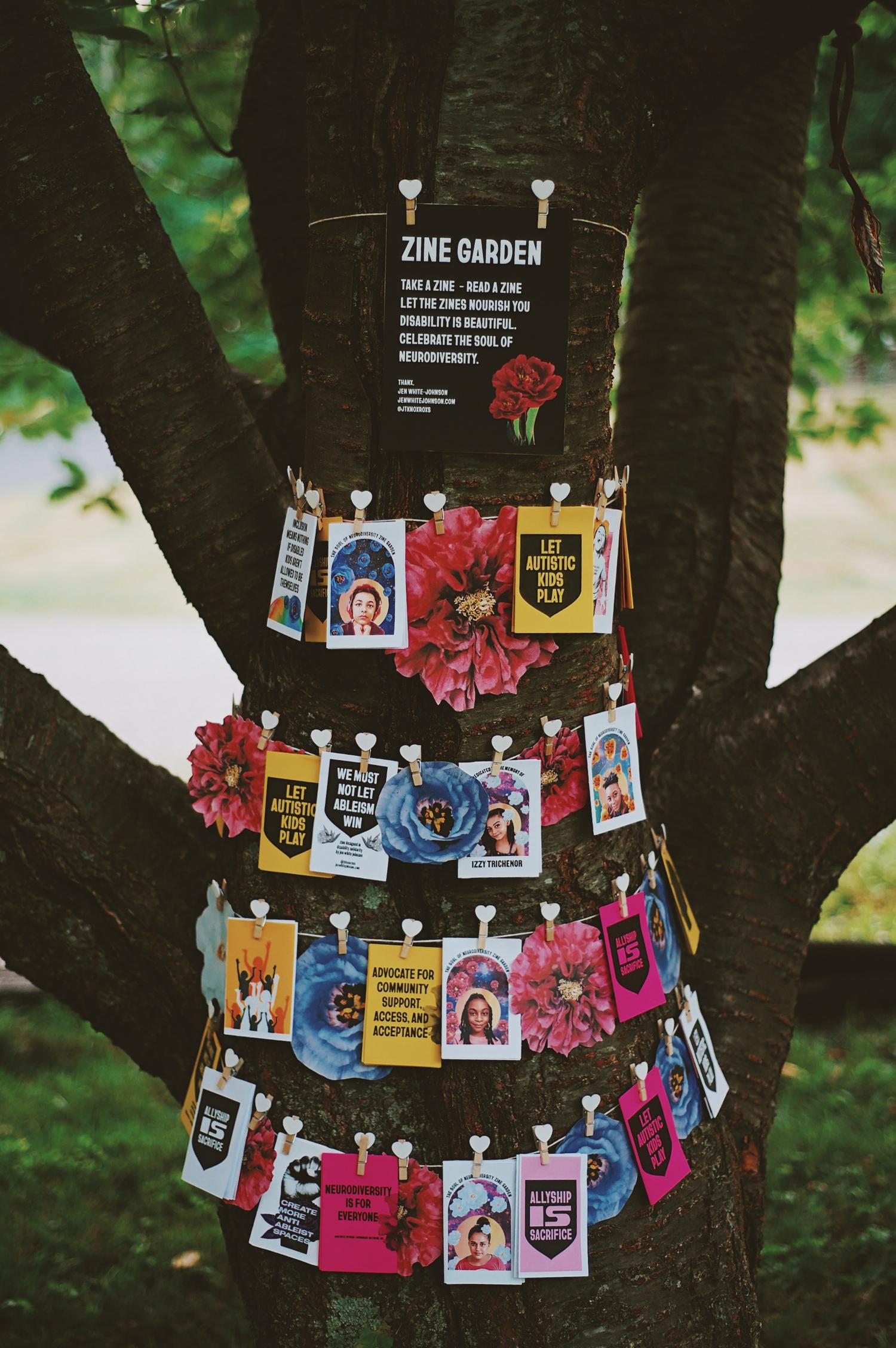
Image Alternative Text: Depicted is artwork facilitated by Jen White–Johnson for the "Soulgarden of Neurodiversity" at the Wassaic Project Artist Residency. Digital/mixed media collage portraits are depicted, affixed on a tree, as part of an outdoor zine installation. Learn more about the project here.
Annie Elainey
Elainey is an artist and activist for lesbian, gay, bisexual, transgender, queer or questioning, intersex, and asexual (LGBTQIA+) and disability rights who advocates for accessibility, media representation, and body positivity for marginalized communities. In 2010, she created Stop Hating Your Body, a Tumblr forum for BIPOC, LGBTQIA+, people with disabilities, and all marginalized communities to share stories and content on body image and self-love; as well as a YouTube channel on personal recovery from an eating disorder. Diagnosed with Ehlers–Danlos syndromes (EDS), a genetic collagen disorder, Elainey shared experiences living with chronic pain on her YouTube channel. She critiqued the 2017 Women's March for its lack of accessibility and visibility for people with disabilities, and thus created a shirt with the slogan, "The Future is Accessible."
Learn more about Elainey on her website.